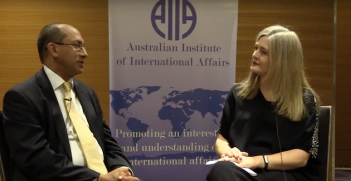Reasons to be Cheerful: A Vision for Britain After Brexit

While Britain may be leaving the European Union, it does not intend to leave Europe. Instead, it is seeking to forge new relationships across the Channel and around the world that are strong, resilient and committed to the future.
In essence, the vision for Britain after Brexit is simple: the UK wants a deep and special partnership with the European Union. We want the right deal overseas and the right deal for people and businesses in the UK. We want a set of closer relationships with our key, like-minded overseas partners, including of course Australia. We want a country that is stronger, fairer, more united and more outward-looking than ever before.
At this point, some bright spark—a journalist, a think-tanker, a politician, a businessperson—usually pops up and says, “Yes, but in the words of The Rolling Stones: You can’t always get what you want.”
In fact, if you look at the media in general on the subject of Brexit, there is an awful lot of doom around. So I raise you The Rolling Stones and bring you, Ian Dury and the Blockheads’ song ‘Reasons to be Cheerful, Part 3’. It’s a shopping-list song, a simple list of many reasons to be cheerful. This song came to mind when I was thinking about Brexit—there is so much gloom around, so much pessimism. I don’t subscribe to this and think there are ‘Reasons to be Cheerful, Part 3’, when we think about our vision for Britain after Brexit. Here are some of them.
Negotiations are underway
The UK is leading the way on building a new, positive and constructive partnership with the EU. Our approach to that partnership has been set out: in Prime Minister Theresa May’s 17 January Lancaster House speech, in the prime minister’s Article 50 letter of 29 March and most recently in her 22 September speech in Florence.
The commencement of formal negotiations on 19 June has been followed by a series of position papers detailing the government’s vision to inform the negotiations and how the UK plans to engage with the rest of the world (e.g. customs and trade published on 9 October). We have shared these with the Australian government, there are 18 of them representing detailed and advanced policy thinking about our future outside the EU.
This month saw the fifth round of EU exit negotiations in Brussels, involving technical discussions on citizens’ rights, the financial settlement and other separation issues, including Ireland and Northern Ireland. Concrete progress was made including on nuclear safeguarding, civil judicial cooperation, and privileges and immunities, but there remains some way to go. In the words of Coldplay in their song, ‘The Scientist’, “Nobody said it was easy. It’s such a shame for us to part.”
Reaffirming this progress, at a European Council meeting in Brussels on 23 October, which featured a working dinner of EU leaders, Prime Minister May spelled out her vision for a new partnership. Remarking upon the “new momentum given by the Florence speech”, European Council President Donald Tusk spoke of his impression that “the reports of a deadlock between the EU and UK have been exaggerated” and informed the group of the council’s agreement to start internal preparatory discussions in relation to the EU’s future relationship with the UK.
The UK and EU chief negotiators—David Davis and Michel Barnier—have said from the outset that some parts of this process will be difficult, but have also noted that constructive engagement is apparent. A win-win agreement is massively in the interests of both the United Kingdom and of the European Union. We will get there.
Opportunities ahead
First of all, in our relationship with Europe, It’s important to stress that the referendum vote on 23 June last year was a vote to leave the EU, not a vote to leave Europe. Britain is not abandoning Europe and it remains in Britain’s national interest that the EU should succeed after we’ve left. Our ties with Europe—across trade, defence, intelligence, security, science and innovation, and people-to-people links—run deep and will remain as we realise a new relationship with Europe.
It will also mean fresh opportunities to become even more global and international in action and spirit. To quote our Foreign Secretary, Boris Johnson, in his Lowy Lecture:
“And when we do that deal [with the EU] I believe we will create a solution that has been so long in the making—a strong EU, buttressed and supported by a strong UK, with each side trading freely with the other, and with the UK able to think about new opportunities in the rest of the world.”
In other words, Britain’s decision to leave does not mean it’s stepping back from the world. We hold fast to a vision of a ‘global Britain’ that is respected abroad, tolerant at home, engaged in the world and working with our international partners to advance the prosperity and security of our citizens.
I’ve heard many people say that the UK will turn in on itself while it works out how to leave the EU, but consider the evidence. You’re seeing the UK out and about in the world, arguably more engaged than ever before. There will be big economic opportunities too. The UK economy remains strong, predictions of doom not realised. Business knows this I think, and I get a real sense of pragmatism among UK and Australian enterprises of all sizes which are, to use a very British phrase, keeping calm and carrying on with expansion and investment plans into each other’s markets.
Of course, Brexit presents challenges but we believe the UK will remain one of the best places in the world to do business and that fresh opportunities will emerge in the post-Brexit world.
Future of the UK-Australia relationship
We want to use Brexit as an opportunity to strengthen relations with countries like Australia, and become more engaged in the Asia-Pacific region. In the last month we’ve seen, for example, more than 40 UK businesses showcasing their engineering and technology wares at Australia’s biggest maritime exposition; Australian tech entrepreneurs pitching their next big ideas to the Duke of York for the chance to visit London and connect with global leaders; and a landmark commercial deal struck for Australia’s CSIRO to access the UK’s NovaSAR earth observation satellite.
We also want to make it easier for our businesses and our countries to trade and invest with and in each other’s countries. The Secretary of State for International Trade, Dr Liam Fox, has said that Australia is one of his top three priorities for a future trade deal, the others being the US and New Zealand.
To recap, these are my Brexit reasons to be cheerful:
- We’re on the way. Detailed negotiations have started and we’re making progress.
- There are a myriad of new opportunities ahead. Challenges too, of course, but ultimately we can look ahead to the UK to becoming more active globally and international in spirit.
- There is a bright future ahead for the UK-Australia relationship. We can all be part of that.
Her Excellency Menna Rawlings CMG is the British High Commissioner to Australia. This is an extract from the High Commissioner’s speech to AIIA VIC on 24 October 2017.
This article is published under a Creative Commons Licence and may be republished with attribution.





